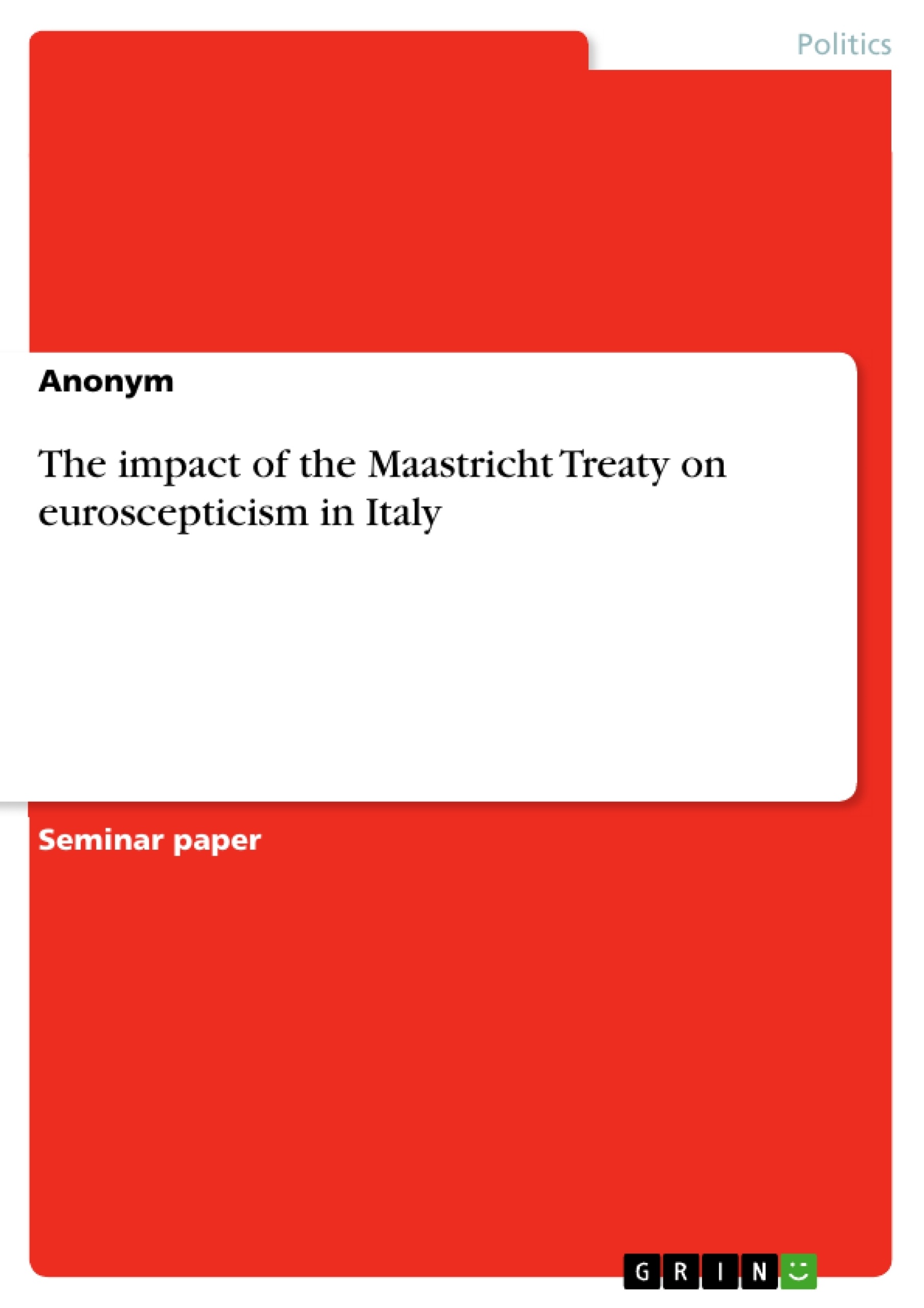Euroscepticism is a phenomenon that has evolved in many EU-member states in the last decade and has quite clearly manifested itself in the Brexit debate. Italy, despite being a founding member and historically pro-European, also started to establish Eurosceptic approaches and tends to blame the EU, especially the Euro, for its economic problems. This paper seeks to analyze the origin of Euroscepticism in Italy by looking at the reform programs that were imposed after the Maastricht convergence criteria required prospective members to cut their deficit and debt ratio.
The resulting cuts in social expenditure created a public opposition towards the EU. Yet, even though Euroscepticism evolved, the Maastricht treaty can be seen both as an opportunity and a challenge. The emergence of Euroscepticism, however, is a general threat to the functioning and credibility of the EU. There are numerous reasons for countries to develop Euroscepticism. As for the Italian case, some scholars explain Euroscepticism by the accumulation of external historical factors, like the Maastricht Treaty of 1992.
Inhaltsverzeichnis (Table of Contents)
- Introduction
- From the Maastricht criteria to the EMU
- The Maastricht Convergence Criteria
- Reforming the welfare state
- Results
- Conclusion
Zielsetzung und Themenschwerpunkte (Objectives and Key Themes)
This paper examines the impact of the Maastricht Treaty on the development of Euroscepticism in Italy. The study aims to understand how the treaty's convergence criteria, which required Italy to implement significant reforms to its welfare state, contributed to a rise in Eurosceptic sentiment.
- The influence of the Maastricht Treaty on Italy's welfare state reforms
- The impact of the Maastricht criteria on Italian public opinion and Euroscepticism
- The relationship between the European Monetary Union (EMU) and Euroscepticism in Italy
- The role of fiscal adjustments and welfare state reforms in shaping Eurosceptic attitudes
- The potential consequences of Euroscepticism for the future of European integration
Zusammenfassung der Kapitel (Chapter Summaries)
- Introduction: This chapter provides an overview of the rise of Euroscepticism in Italy, particularly highlighting the surge in support for Eurosceptic parties during the 2018 general election. It discusses the historical context of Italy's commitment to European integration and the factors contributing to the emergence of Euroscepticism, including the Maastricht Treaty and the 2008 financial crisis.
- From the Maastricht Criteria to the EMU: This chapter delves into the Maastricht Treaty's significance for the creation of the European Monetary Union (EMU) and its impact on Italy. The chapter explores the convergence criteria set forth in the treaty, focusing on the criteria related to inflation, interest rates, currency stability, and budget deficits. It highlights the challenges faced by Italy, including its high deficit, debt ratio, and the potential consequences of a single currency.
- The Maastricht Convergence Criteria: This chapter examines the specifics of the Maastricht convergence criteria and how they impacted Italy's economic policy. It explains the rationale behind these criteria, aiming to ensure that countries were economically prepared to join the EMU. The chapter discusses the challenges that Italy faced in meeting the criteria, particularly those relating to its budget deficit and national debt. The chapter also notes the efforts made by successive Italian governments to achieve the required economic standards.
Schlüsselwörter (Keywords)
The main focus of this paper is the relationship between the Maastricht Treaty, its influence on the Italian welfare state, and the emergence of Euroscepticism in Italy. Key concepts include the Maastricht convergence criteria, the European Monetary Union (EMU), welfare state reforms, public opinion, Euroscepticism, and European integration.
- Arbeit zitieren
- Anonym (Autor:in), 2019, The impact of the Maastricht Treaty on euroscepticism in Italy, München, GRIN Verlag, https://www.hausarbeiten.de/document/459946



